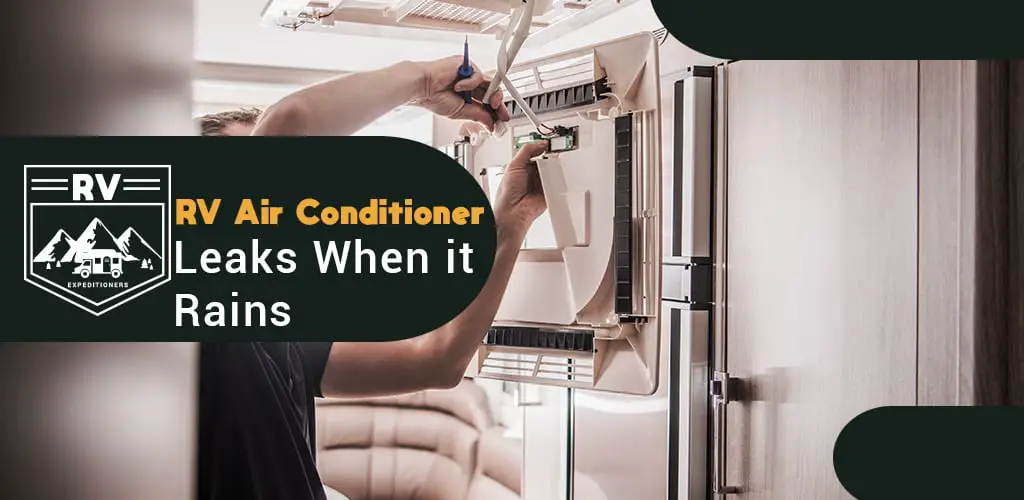Ever went camping on the unfortunate weekend that it decided to rain? Well aside from a wet night, it can have lost-lasting effects on your RV. With the air conditioner being placed above in the RV, it’s normal for you to believe the leak is in the roof. That may not be the case. The leak could be coming from your air conditioner itself.
Why Does My RV Air Conditioner Leak After It Rains?
There are multiple reasons your air conditioner could be leaking. It could be damage to your roofing or caulking at the top. Cracks in your roof could be leaking into your air conditioner. Proper sealing prevents the RV from being properly sealed from the weather. Rain, snow, and sleet can then penetrate the roof and then leak down into the air conditioning. You’ll have to get on your roof and check for holes. Make sure to wear closed-toe shoes while walking around on the roof of your RV. If there are no holes on the top of your roof, start your checks for the build of the roof.
A broken or missing shroud is an issue directly affecting the air conditioning system. The air conditioner won’t properly cool with a malfunctioning shroud. This causes the moisture from the system to just build up and leak into the RV. That extra moisture ruins the integrity of your roof and can cause rusting. That rusting will result in more damage and possibly holes in the roof.
The mounting bolts are something else to watch out for when inspecting for leaks. Bolts can be loose or not properly aligned. Faulty bolts can become more undone when the air conditioner comes on or while the RV is in the drive. The shaking from the drive can rattle those bolts loose. This will create a similar problem to the broken shroud. The moisture will escape wherever it can fit.
Also, check for broken or faulty rubber gaskets. Improperly placed (broken, cracked, too tight) gaskets can create small pockets that allow water to slip through. These gaskets should work together with the bolts. If you find an issue with one of these items, check the other just to double-check.
How to Fix Air Conditioner Leaks
Once you’ve spotted all your issues, you’ll have to fix them. A damaged roof is easy to fix for the most part. If you are good with metalwork, patching small holes with tap welds or small sheet metal can be cheap. If not, visit your local auto shop for metal sealant. Applying it directly to the holes and allowing proper drying time will give you more time with your vehicle. If the damage is severe, have your roof replaced. Rain is a minor concern but the holes can cause bigger safety concerns if left unattended. Be sure to unclog any drain holes while you’re on the roof. That build up forces the water into
Gaskets and bolts are easy to fix. Find out the size of your current ones and replace them. Buying them in bulk and replacing them all at once will make maintenance easier later down the road. No matter the different damage levels, changing them at once gives extra security when knowing the integrity of your roof.
Any other issue can be fixed by general changes. Managing the gap space the air conditioner and the roof prevents extra condensation. The evaporator coil could also be dirty or rusty. When you open your system, you can immediately see if the evaporator coil is rusted. Slowly remove it and replace it with a new coil. Beware that condensation could very much so be the cause of a leak so if there are no other issues, the roof is just too cold and moist.
RV Air Conditioner Maintenance Tips
Be sure to inspect your RV regularly. When you keep track of your RV’s condition, it’s cheaper and easier to keep up with maintenance. At least once a month, walk around your RV and inspect all the major components. Check for new scrapes and dings.
Maintenance is easiest when you cover and store your RV. Keep it out of the sun and severe weather as best as possible. If you don’t have a tree line or carport to place your vehicle, get an RV cover to protect your vehicle from the weather. If you live in an area with more debris, you can use two covers to prevent more damage. The more you keep nature away from your RV, the longer its outer coating will be protected.
To protect the inside of your RV, perform test runs frequently. Your RV should never go a week without being started up. Just like a regular car, it needs to be driven frequently to assess the maintenance needs. When you casually drive, you can spot all the issues before the family trip.

